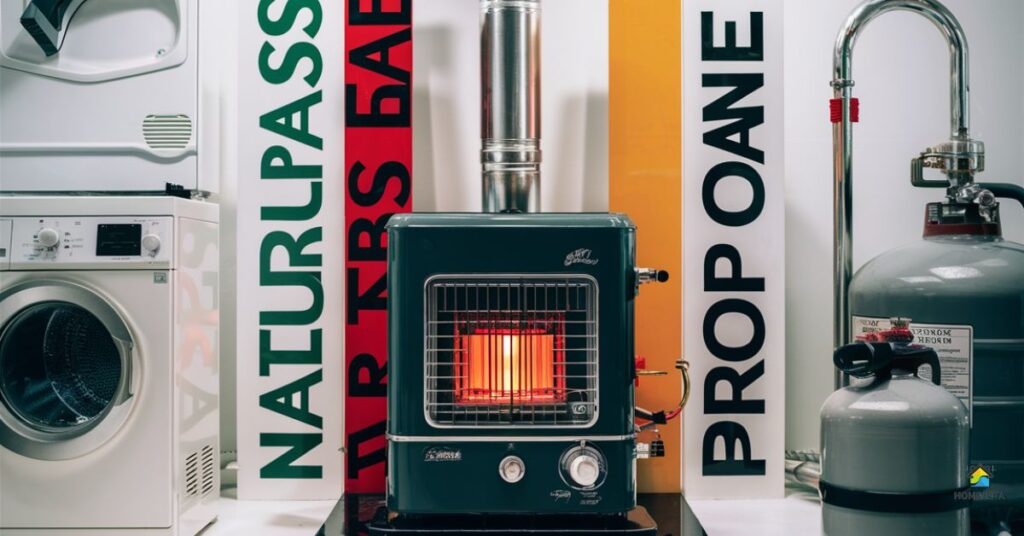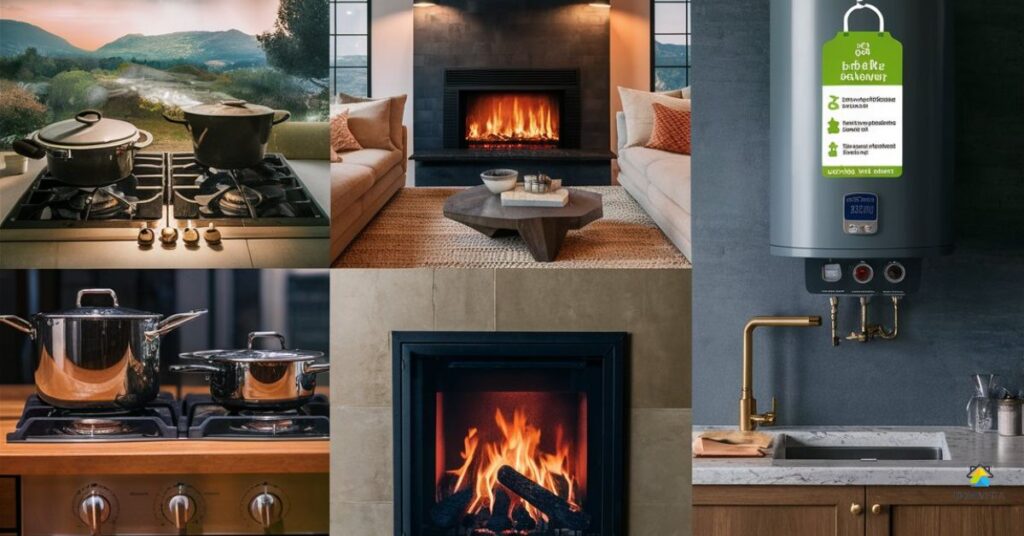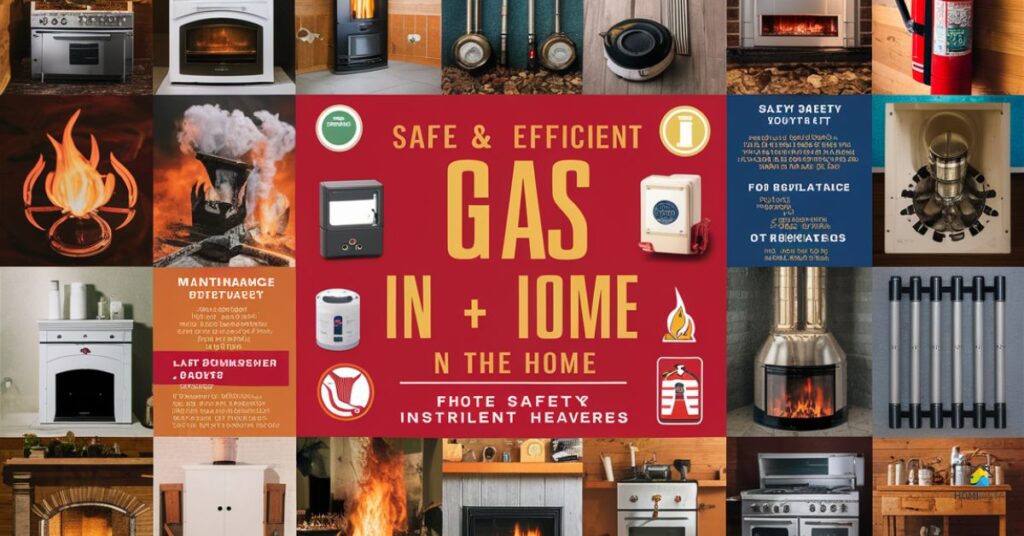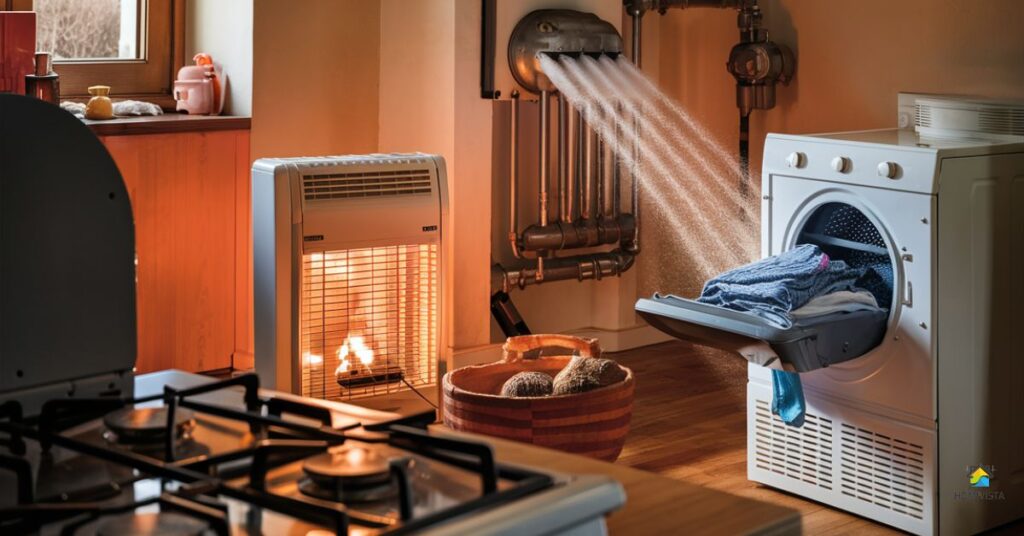Gas is an essential component of many household activities. It is commonly used for cooking on gas stoves, heating water with water heaters and keeping homes warm with central heating systems.
Gas is also used for drying clothes in gas dryers, creating a cozy atmosphere with gas fireplaces, cooking outdoors on gas grills and providing backup electricity with gas-powered generators. These various uses demonstrate the significance of gas in today’s homes and the importance of managing gas consumption effectively.
What Is Natural Gas?
Natural gas is a versatile fossil fuel widely used for energy needs. It forms naturally from decomposed organic matter deep underground. Extracted through drilling, it’s a colorless and odorless gas that becomes flammable when mixed with air. Its main components are methane and other hydrocarbons. Natural gas is vital for heating, electricity generation, cooking, and industrial processes globally.
What Are the Differences Between Natural Gas and Propane?
| Aspect | Natural Gas | Propane |
| Source | Found underground and extracted through drilling | Extracted during oil refining or obtained from natural gas |
| Composition | Mainly consists of methane and other hydrocarbons | Composed of propane molecules |
| Energy Content | Less energy per cubic foot compared to propane | Higher energy content per cubic foot than natural gas |
| Storage | Typically stored in underground pipelines and tanks | Stored in pressurized tanks as a liquid |
| Physical Properties | Lighter than air, dissipates if released outdoors | Heavier than air, tends to sink if released outdoors |
| Usage | Commonly used for home heating, cooking, and electricity | Utilized in rural areas or where natural gas isn’t available |
| Transportation | Distributed through pipelines to homes and businesses | Transported in tanks by trucks for delivery |
| Environmental Impact | Emits fewer greenhouse gases compared to propane | Releases more greenhouse gases when burned |
What Appliances Are Convertible Between Natural Gas and Propane?

| Appliance | Convertible Between Natural Gas and Propane? |
| Stove/Oven | Yes |
| Water Heater | Yes |
| Furnace/Boiler | Yes |
| Clothes Dryer | Yes |
| Fireplace | Yes |
| Grill | Yes |
| Generator | Yes |
| Heater | Yes |
| Cooktop | Yes |
| Outdoor Lighting | Yes |
Natural Gas Safety at Home
Ensuring natural gas safety at home is essential to prevent accidents and protect your family. Here are some key safety measures:
Installation by Professionals: Have gas appliances installed by certified professionals to ensure proper setup and connections.
Regular Inspections: Schedule regular inspections of gas appliances, pipelines and vents by qualified technicians.
Gas Leak Detection: Know the signs of a gas leak, such as a rotten egg smell (added odorant), hissing sounds or dead vegetation near pipelines. Install gas detectors for early warning.
Ventilation: Maintain good ventilation in areas with gas appliances to prevent carbon monoxide buildup.
Appliance Use: Follow manufacturer’s instructions for safe usage of gas appliances. Keep flammable materials away from stoves and heaters.
Emergency Preparedness: Know how to shut off the gas supply in case of emergencies. Have an evacuation plan and contact details for emergency services readily available.
Children and Pets: Educate children and pets about the dangers of gas and ensure they do not tamper with appliances or pipelines.
Gas Line Marking: Mark gas pipelines in your yard to prevent accidental damage during digging or construction work.
Read this blog: How To Get Around Netflix Household
Benefits Of Using Gas In Your Home

Gas offers numerous advantages as a fuel source for your home:
Gas is More Affordable: Compared to electricity or other fuels, gas tends to be more cost-effective, leading to potential savings on energy bills.
Clean Energy Source: Natural gas is considered a cleaner burning fuel, emitting fewer pollutants and greenhouse gases compared to other fossil fuels like coal or oil.
Good for Appliances: Gas-powered appliances often provide faster and more precise cooking, heating and drying compared to electric counterparts, contributing to better efficiency and performance.
Reliable Energy Source: Natural gas is known for its reliability, providing a continuous energy supply even during power outages, making it a dependable choice for home heating and cooking needs
Uses of Gas in Your House
Gas serves multiple purposes in a household, contributing to convenience and efficiency in daily activities:
Heating Water: Gas-powered water heaters provide a reliable and efficient way to heat water for bathing, cleaning and other household needs.
Cooking: Gas stoves and ovens offer precise temperature control and quick heating, making them popular choices for cooking enthusiasts and professional chefs alike.
Lighting a Fire: Gas fireplaces create a cozy ambiance and provide a convenient alternative to traditional wood-burning fireplaces, with easy ignition and no need for cleanup.
Outdoor Grilling: Gas grills allow for convenient outdoor cooking experiences, offering consistent heat and easy temperature adjustments for perfect grilling results.
Drying Clothes: Gas dryers offer faster drying times compared to electric dryers, making them energy-efficient and ideal for busy households with frequent laundry needs.
Common Gas-Powered Household Appliances
Gas-powered appliances are prevalent in households, offering efficiency and reliability in various areas:
Ranges, Cooktops, Grills, Stoves, and Ovens: Gas cooking appliances provide precise temperature control and quick heat adjustment, making them favorites among chefs and home cooks for their cooking versatility and efficiency.
Air Conditioning: Gas-powered air conditioning systems, though less common, offer efficient cooling and are environmentally friendly compared to traditional electric units, contributing to lower energy costs.
Clothes Dryers: Gas dryers use natural gas to dry clothes faster than electric models, reducing drying time and energy consumption while providing excellent results.
Freezers and Refrigerators: Some models of freezers and refrigerators can run on gas, particularly in areas with unreliable electricity supply, ensuring food preservation and storage even during power outages.
Tips For Using Gas In Your Home

Here are some tips for using gas safely and efficiently in your home. By these tips, you can enjoy the benefits of using gas in your home safely and efficiently.
Professional Installation: Always have gas appliances installed by qualified professionals to ensure proper setup and safety.
Regular Maintenance: Schedule regular maintenance checks for gas appliances and pipelines to detect and address any issues early on.
Gas Leak Detection: Familiarize yourself with the signs of a gas leak, such as a rotten egg smell (added odorant), hissing sounds or dead vegetation near gas lines. Install gas detectors for added safety.
Ventilation: Ensure proper ventilation in areas with gas appliances to prevent the buildup of carbon monoxide. Install carbon monoxide detectors for early detection of this odorless gas.
Follow Manufacturer’s Instructions: Adhere to the manufacturer’s guidelines for the safe use and maintenance of gas appliances to prevent accidents and ensure optimal performance.
Emergency Preparedness: Know how to shut off the gas supply in case of emergencies and have a well-defined evacuation plan. Keep emergency contact numbers readily available.
Keep Flammable Items Away: Store flammable materials away from gas appliances and avoid using them near open flames to reduce fire hazards.
Educate Family Members: Educate everyone in your household about gas safety protocols, including how to respond to gas leaks or emergencies.
How Can I Use Less Gas at Home?
To reduce gas consumption and save energy, consider these effective strategies. By implementing these tips, you can effectively reduce your gas usage at home while maintaining a comfortable and energy-efficient living environment.
Upgrade to Energy-Efficient Appliances
Invest in modern, energy-efficient gas appliances such as furnaces, water heaters, and stoves. Look for appliances with ENERGY STAR ratings, which indicate superior energy efficiency.
Improve Home Insulation
Properly insulate your home to reduce heat loss in winter and keep cool air in during summer. Insulate walls, floors, ceilings and attics to create a more energy-efficient living space.
Seal Air Leaks
Identify and seal air leaks around doors, windows, vents, and ducts using weather stripping, caulk, or insulation. This prevents warm or cool air from escaping, reducing the workload on your heating and cooling systems.
Use a Programmable Thermostat
Install a programmable thermostat to regulate your home’s temperature based on your schedule. Set lower temperatures when you’re asleep or away to save energy without sacrificing comfort.
Maintain Your HVAC System
Regularly service and maintain your heating, ventilation, and air conditioning (HVAC) system. Clean or replace air filters, check ductwork for leaks and ensure proper airflow to improve system efficiency.
Optimize Water Heating
Lower the temperature setting on your water heater to 120°F (49°C) to save energy without compromising comfort. Consider installing a tankless water heater for on-demand hot water and greater efficiency.
Use Energy-Saving Cooking Techniques
When cooking on gas stoves or ovens, use lids on pots and pans to retain heat and cook food faster. Match burner sizes to pot sizes for efficient heat transfer.
Reduce Water Usage
Conserve hot water by taking shorter showers, fixing leaks promptly, and using cold water for laundry whenever possible. Efficient water usage reduces the energy needed to heat water.
Upgrade Windows and Doors
Install energy-efficient windows and doors with double or triple glazing and proper seals to reduce heat transfer and improve insulation.
Utilize Natural Light and Ventilation
During daylight hours, rely on natural light instead of artificial lighting. Open windows for cross ventilation and fresh air circulation to reduce the need for mechanical cooling.
Conduct Energy Audits
Consider hiring a professional energy auditor to assess your home’s energy usage and recommend personalized energy-saving measures.
Natural Gas Hazards and Precautions

Natural gas, while a convenient and efficient energy source, poses certain hazards that require awareness and precautionary measures. Here’s an overview of natural gas hazards and precautions:
Gas Leaks
Hazard: Natural gas leaks can lead to fire, explosions and carbon monoxide poisoning if not detected and addressed promptly.
Precautions: Install gas detectors and carbon monoxide alarms in key areas of your home. Familiarize yourself with the signs of a gas leak, such as a rotten egg smell (added odorant), hissing sounds or dead vegetation near gas lines. If you suspect a gas leak, evacuate immediately and contact emergency services.
Carbon Monoxide (CO) Poisoning
Hazard: Incomplete combustion of natural gas can produce carbon monoxide, a colorless, odorless gas that can be deadly in high concentrations.
Precautions: Install carbon monoxide detectors on every floor of your home and near sleeping areas. Have gas appliances inspected regularly by qualified technicians to ensure proper ventilation and combustion.
Fire and Explosions
Hazard: Natural gas is highly flammable and can ignite if exposed to sparks, flames or electrical malfunctions.
Precautions: Keep flammable materials away from gas appliances and avoid using gas near open flames. Ensure appliances are installed and maintained by professionals to prevent gas leaks.
Asphyxiation
Hazard: Natural gas can displace oxygen in enclosed spaces, leading to oxygen deficiency and asphyxiation.
Precautions: Ensure adequate ventilation in areas with gas appliances to prevent oxygen depletion. Never use gas-powered devices in closed or poorly ventilated spaces.
Pipeline Damage
Hazard: External factors like digging, construction, or natural disasters can damage gas pipelines, leading to leaks and safety hazards.
Precautions: Mark gas pipelines in your yard to prevent accidental damage during excavation or construction work. Report any suspected gas leaks or pipeline damage to your gas provider immediately.
Also read: How To Remove Gas From Stomach Instantly Home Remedies
Reading Your Meter and Understanding Your Bill
Reading your gas meter and understanding your bill are important aspects of managing your gas usage and expenses effectively. Here’s a guide to help you with these tasks:
Reading Your Gas Meter
Locate Your Meter: Your gas meter is usually located outside your home, near the gas supply entry point. It may be in a meter box or mounted on a wall.
Read the Dials or Digital Display: Gas meters can have dials or digital displays. For dial meters, read the numbers from left to right, ignoring the last dial (usually a smaller one). Record the numbers shown by each dial. For digital meters, note down the displayed numbers.
Record the Reading: Write down the current reading along with the date. Keep a record of your readings to track your gas usage over time.
Calculate Usage: To calculate your gas usage between readings, subtract the previous reading from the current reading. Gas usage is typically measured in cubic feet or cubic meters.
Understanding Your Gas Bill
Billing Period: Your bill will indicate the billing period, which is the timeframe for which you are being charged for gas usage. It may be monthly, bimonthly or quarterly.
Meter Reading: The bill will show the previous and current meter readings. Verify these readings against your own meter readings to ensure accuracy.
Usage Charges: Your bill will detail the amount of gas used during the billing period, usually measured in cubic feet or cubic meters. The usage charges are calculated based on the gas rate per unit (e.g., per cubic foot or per cubic meter).
Service Charges: In addition to usage charges, your bill may include service charges or fixed fees for maintaining the gas supply and infrastructure.
Taxes and Fees: Taxes, regulatory fees, and other surcharges may be listed on your bill, contributing to the total amount due.
Total Amount Due: The bill will show the total amount due for the billing period, including usage charges, service charges, taxes and fees.
Payment Options: Your bill will provide information on payment options, including online payments, direct debit, check payments, and in-person payment locations.
Contact Information: The bill will have contact information for your gas provider’s customer service department. Reach out to them if you have questions about your bill, meter readings, or gas usage.
Frequently Asked questions
How can I detect a gas leak in my home?
Signs of a gas leak include a distinctive rotten egg smell (added odorant), hissing sounds near gas lines, or dead vegetation around pipelines. Installing gas detectors enhances early detection.
Can I use natural gas appliances during a power outage?
Yes, natural gas appliances typically operate independently of the electrical grid, making them reliable during power outages. However, ensure proper ventilation and safety measures.
What should I do if I suspect a gas leak?
If you suspect a gas leak, evacuate the premises immediately, leaving doors and windows open if safe to do so. Contact emergency services and your gas provider from a safe location.
Are natural gas appliances more energy-efficient than electric ones?
Natural gas appliances often offer higher efficiency and faster performance compared to electric counterparts, resulting in potential energy savings and lower utility bills.
How can I reduce my natural gas consumption at home?
To reduce gas consumption, consider upgrading to energy-efficient appliances, improving home insulation, sealing air leaks, using programmable thermostats and practicing energy-saving habits.
Conclusion
Natural gas is essential for powering our homes and keeping us warm. It is used for cooking, heating water, and running heating systems, making it a convenient and reliable choice for many household needs. To ensure safety, it is important to have gas detectors installed, get regular inspections, and know how to spot signs of a gas leak. By taking these precautions, we can prevent accidents and protect our loved ones.
When we use energy-saving techniques and choose energy-efficient appliances, we can lower our gas usage and cut down on our utility costs. Keeping our gas appliances well-maintained and promptly fixing any leaks also helps create a safer home. By following these steps, we can reap the advantages of natural gas without causing as much strain on our finances or the environment.

Meet Harry, our seasoned home decor specialist with three years of hands-on experience. His passion lies in crafting inviting spaces that reflect your style. From cozy corners to vibrant living rooms. Harry’s keen eye for design ensures every detail enhances the overall aesthetic. Trust him to turn your home into a personalized haven, blending functionality with flair.







